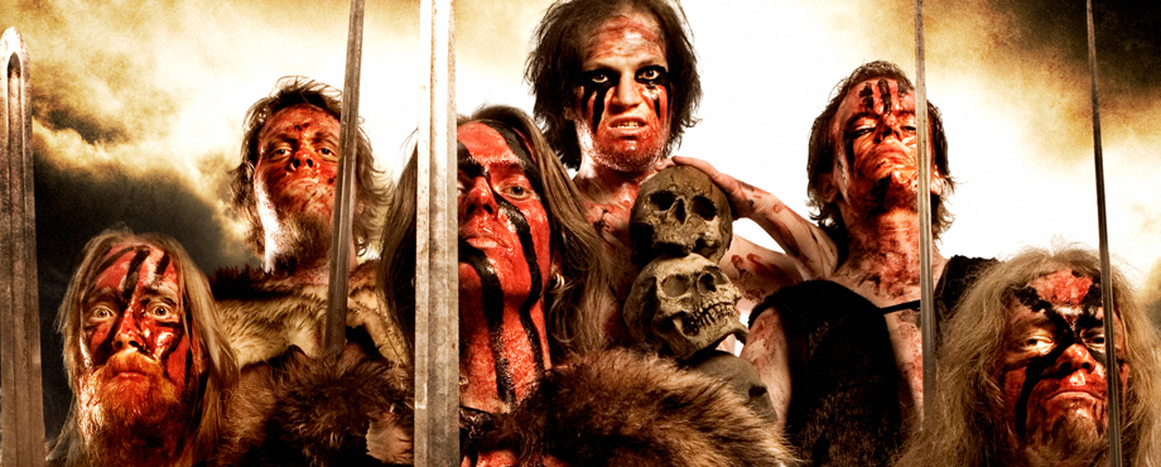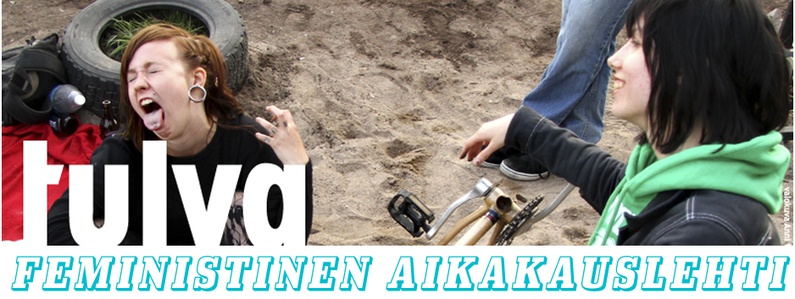
Vikings vs valkyries: who will be victorious in finland's battle of the sexes?
Published on
Translation by:
Bethan MooreWhat with the economic crisis, a rise in alcoholism and the struggle for gender equality, a Finnish man has no choice but to turn away from nostalgia, from a history of savage warriors and untamed landscapes. To miss the modernity bandwagon in a country which prides itself on its work ethic and its economic independence can cost him a lot. Perhaps his life, judging by this lot.
Vikings vs. Valkyries: Who Will Win the Battle of the Sexes in Finland?
What with the economic crisis, the blight of alcoholism and the unstoppable march of gender equality, there is nothing left for the Finnish male to do but retreat into nostalgia for a mythical past of undefeatable warriors and unspoilt forests. However, missing the train to modern life in a country founded on work, pride and economic independence might cost them greatly, and could even cost them their lives.
“Man can even go through the grey stone,” goes the hypnotic refrain of the song of the same title by the metal band, Korpiklaani. This may be so, but I can tell you that after seeing these infamous Vikings eat organic salads, then get drunk in a corner of a club while waiting to be picked up by a girl, I felt they would have trouble going through the toilet door, never mind stone. But what can you do? I’ve come to understand that the Finns are like this, all caught up in nostalgia.
Before the urban, capitalist revolutions, which grew out of technological progress, even before the arrival of Lutheranism, the Kalevala, a story made up of poems and national folk songs, was the only religion here. It tells of a mythological world populated by heroes who have very little in common with mobile technology geeks, offices in the city of Helsinki and lunch time sushi. Väinämöinen The Wise, Ilmarinen The Forger, and Lemminkäinen The Warrior and Seducer are all characters in the Kalevala. They remain undying symbols of the Finnish man with qualities such as cunning, industriousness, bravery and powers of seduction. It may sound a bit like Game of Thrones to you, but this stuff never goes out of fashion here.
Folk Metal: The Music of Choice for the Finnish Macho Man
Metal music is a prime example of this. It is an immensely popular genre in Finland, particularly the increasingly admired sub-genre of folk, or Viking metal. The lyrics are infused with legends and a healthy pinch of old-fashioned male chauvinism. For Jonne Järvelä, front man of Korpiklaani, the Kalevala is the Bible of nostalgia. “I don’t believe the world is going in the right direction,” he tells me while gulping down litres of black coffee. He has just got back from a concert the evening before in the nearby city of Turku. “Men are losing their connection to nature and the value of real work,” he says, and I know what he means. Watching him talk, with his long blond dreads and resemblance to Charles Bronson in Death Wish, I ask myself how could a man like this possibly work at a desk? “Work, hard work, is ingrained in the people of Finland,” he says. “This country is completely covered with forests, so we are used to sweating and getting our hands dirty. Now that machines work instead of us, it is difficult for us to adapt. Trust me, when it’s cold, you need to have something to do.”
Mathias Nygard, the front man of Turisas, another legendary band, puts his finger on the problem. “With such long cold winters, you can’t even relax in the summertime. You have to plan, make provisions, and work hard, otherwise you won’t survive,” he tells me in a bar next to Tavastia, the historic Helsinki rock club. However the weather is not the only issue. “In Finland, which is possibly the least religious country in Europe, there are just two commandments: work hard and obey the law. For protestants, being useful to the State is the important thing, not going to church.”
 One of the possible ways of healing this wound between the past and present, between a subsistence economy (where everyone feels useful) and global capitalism (where, like Nokia, national companies are sold off and the employees are let go) is with alcohol. Jonne is very aware that people drink too much in Finland. “Even I have a few problems,” he confesses, smiling, yet many of his songs celebrate the pleasure of being drunk, as if alcohol were a magical potion allowing you to go back to being men of old. The track ‘Vodka’ is the best example.
One of the possible ways of healing this wound between the past and present, between a subsistence economy (where everyone feels useful) and global capitalism (where, like Nokia, national companies are sold off and the employees are let go) is with alcohol. Jonne is very aware that people drink too much in Finland. “Even I have a few problems,” he confesses, smiling, yet many of his songs celebrate the pleasure of being drunk, as if alcohol were a magical potion allowing you to go back to being men of old. The track ‘Vodka’ is the best example.
Women in Finland are Naturally Feminist
So while the men take refuge in metal and in bars, Finnish women, defined by Jonne as being “feminist by nature, with no need to label themselves as such,” continue their fierce march towards the future. They are not satisfied with the record 86 women elected in a parliament of 200 representatives in 2011, or with Finland being the best place in the world to be a mother, or knowing that Finnish women feel freer and more emancipated compared to southern women. For Finnish feminists it is never enough, “even to the point of humiliating their own husbands,” says Jonne.
Even Tetti Vähämaa, General Secretary of the Feminist Association Union, admits, “it’s likely that women’s independence scares men,” even more so in times of economic crisis. “Losing your job, especially in a society like ours, creates strong feelings of frustration,” she says, welcoming me into a splendid 1920s building in the centre of Helsinki. “It leads men to become violent with themselves and with others. Cases where men kill their wives and children, and then commit suicide are not that rare.
Male Frustration Results in Domestic Violence
 According to the European Commission, Finland has the second highest number of cases of domestic violence in Europe after Estonia. Kostas Tassopoulos knows this only too well. He is head counsellor at Lyömätön Linja, an organisation which has been treating men involved in domestic violence since 1993. “This is not a question of violent people, but of violent behaviours,” he explains. “They are almost always the ones who call us because they are seized by strong feelings of guilt.” Then he shows me a stack of tissues placed on the table in his office. “You have no idea how many it takes to dry my patients’ tears!” he says. Other than alcohol and unemployment, there is also a cultural explanation for domestic violence. “A sort of negative solidarity is customary here. Protestants are taught to resolve their problems individually, so men, who are already less inclined to talk things over, bottle everything up until some kind of violent act becomes inevitable”. However there is a new trend, which Kostas confirms, for violence by women against men. “These days women are judged less by society for what they do,” Tetti the feminist reminds me. “So they feel justified in acting as they want to”. For Finnish men, perhaps there is nothing left to do but dust off their swords and armour.
According to the European Commission, Finland has the second highest number of cases of domestic violence in Europe after Estonia. Kostas Tassopoulos knows this only too well. He is head counsellor at Lyömätön Linja, an organisation which has been treating men involved in domestic violence since 1993. “This is not a question of violent people, but of violent behaviours,” he explains. “They are almost always the ones who call us because they are seized by strong feelings of guilt.” Then he shows me a stack of tissues placed on the table in his office. “You have no idea how many it takes to dry my patients’ tears!” he says. Other than alcohol and unemployment, there is also a cultural explanation for domestic violence. “A sort of negative solidarity is customary here. Protestants are taught to resolve their problems individually, so men, who are already less inclined to talk things over, bottle everything up until some kind of violent act becomes inevitable”. However there is a new trend, which Kostas confirms, for violence by women against men. “These days women are judged less by society for what they do,” Tetti the feminist reminds me. “So they feel justified in acting as they want to”. For Finnish men, perhaps there is nothing left to do but dust off their swords and armour.
Video Credits: Nuclear Blast Records/youtube
 This article is part of a series of special monthly city editions on ‘EUtopia on the ground’; watch this space for upcoming reports ‘dreaming of a better Europe’ from Naples, Dublin, Zagreb and Helsinki. This project is funded with support from theEuropean commission via the French ministry of foreign affairs, the Hippocrène foundation and the Charles Léopold Mayer foundation for the progress of humankind
This article is part of a series of special monthly city editions on ‘EUtopia on the ground’; watch this space for upcoming reports ‘dreaming of a better Europe’ from Naples, Dublin, Zagreb and Helsinki. This project is funded with support from theEuropean commission via the French ministry of foreign affairs, the Hippocrène foundation and the Charles Léopold Mayer foundation for the progress of humankind
Translated from Vichinghi vs valchirie: chi vincerà la sfida dei sessi in Finlandia?



